Unit 7 The natural world 知识梳理 2025-2026学年八年级英语上册新课标(核心素养)同步大师课堂(牛津译林版2024)
文档属性
| 名称 | Unit 7 The natural world 知识梳理 2025-2026学年八年级英语上册新课标(核心素养)同步大师课堂(牛津译林版2024) | 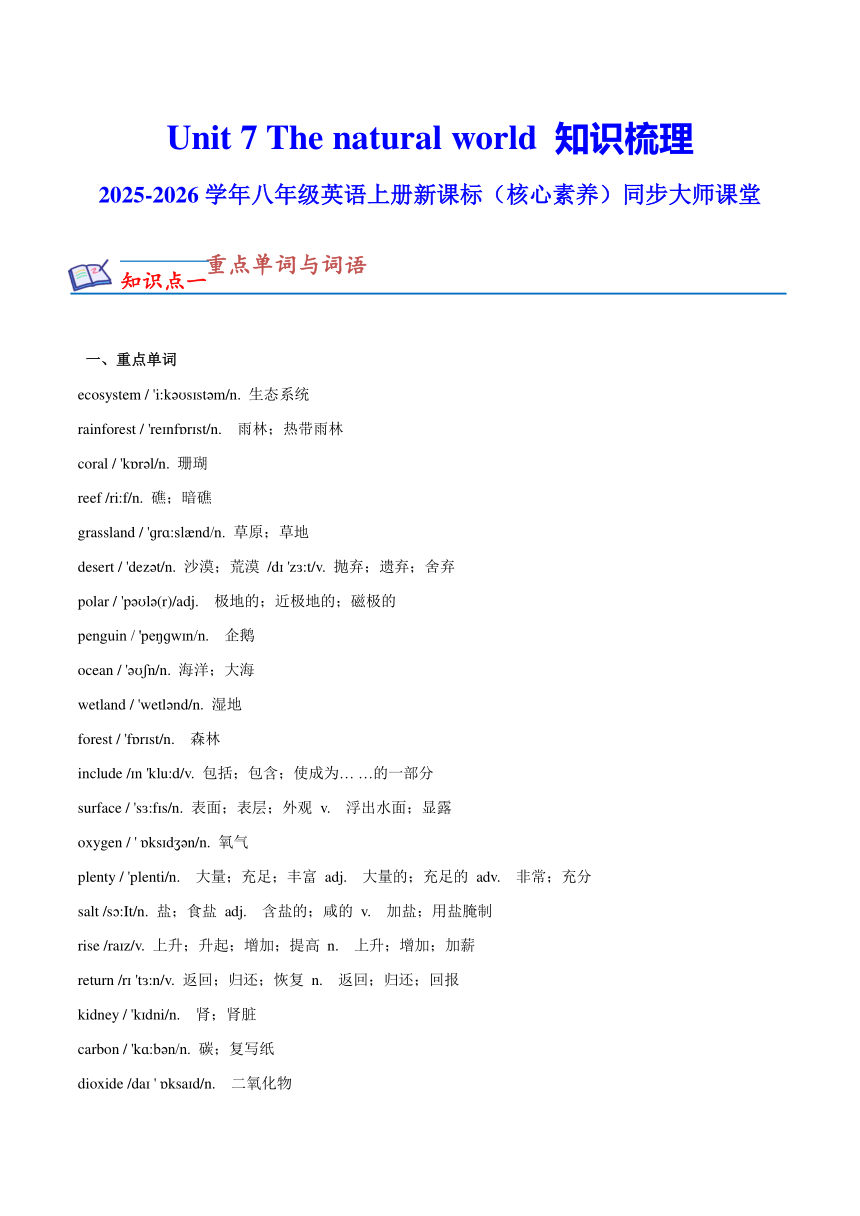 | |
| 格式 | docx | ||
| 文件大小 | 42.2KB | ||
| 资源类型 | 教案 | ||
| 版本资源 | 译林版 | ||
| 科目 | 英语 | ||
| 更新时间 | 2025-07-09 21:54:53 | ||
图片预览

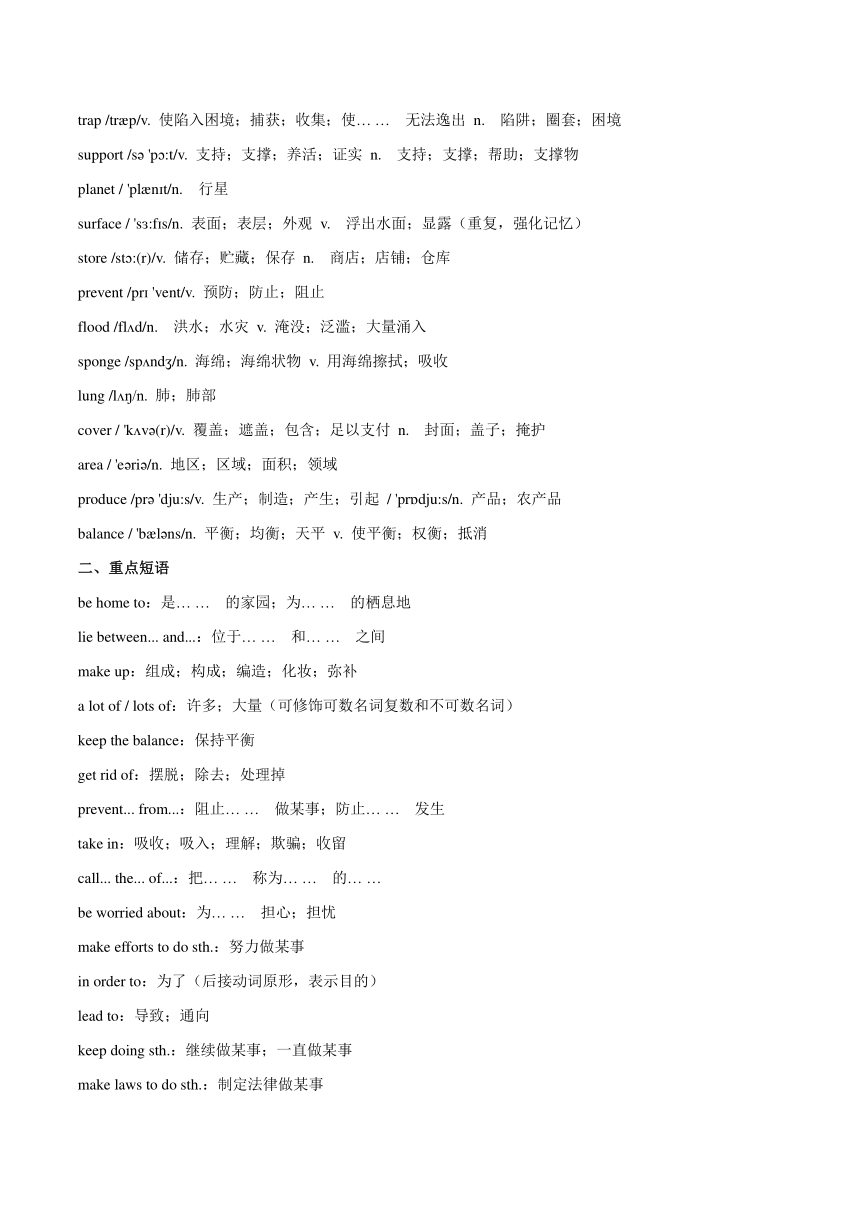
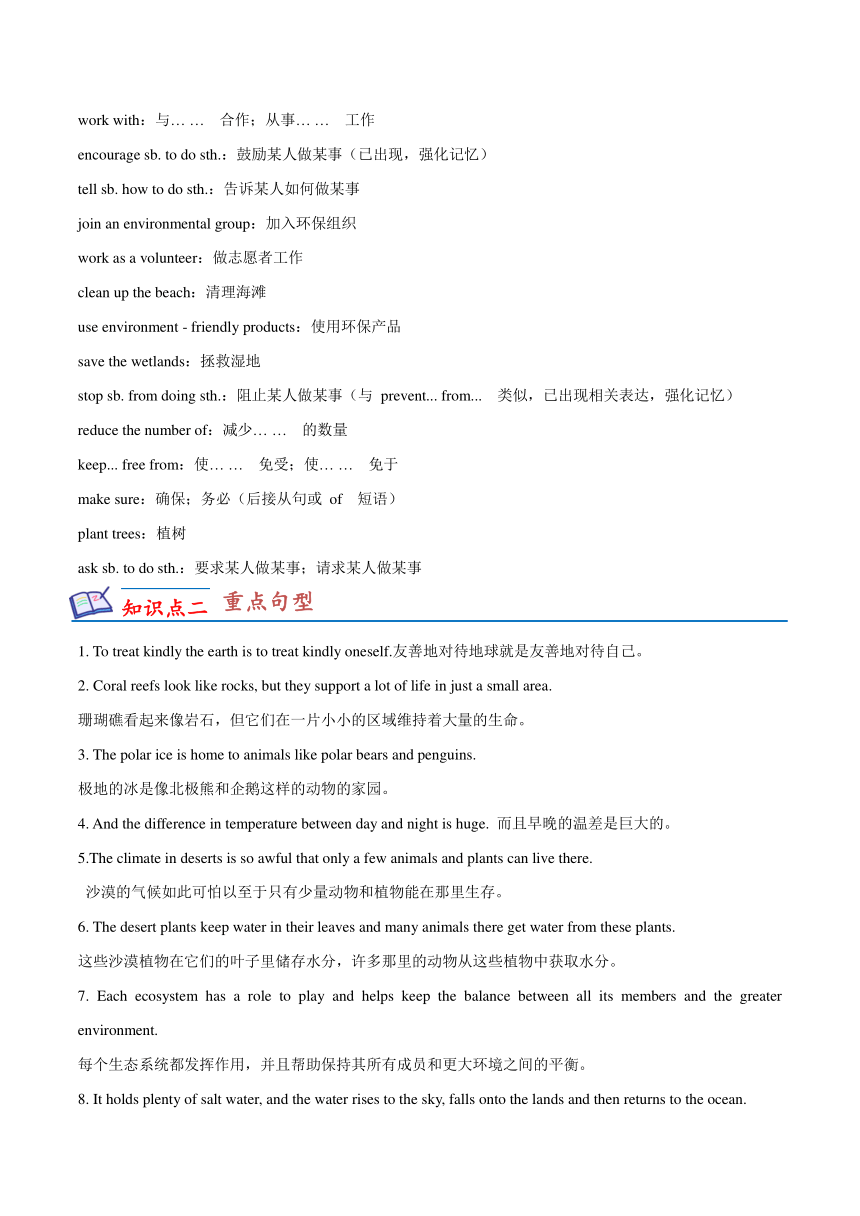
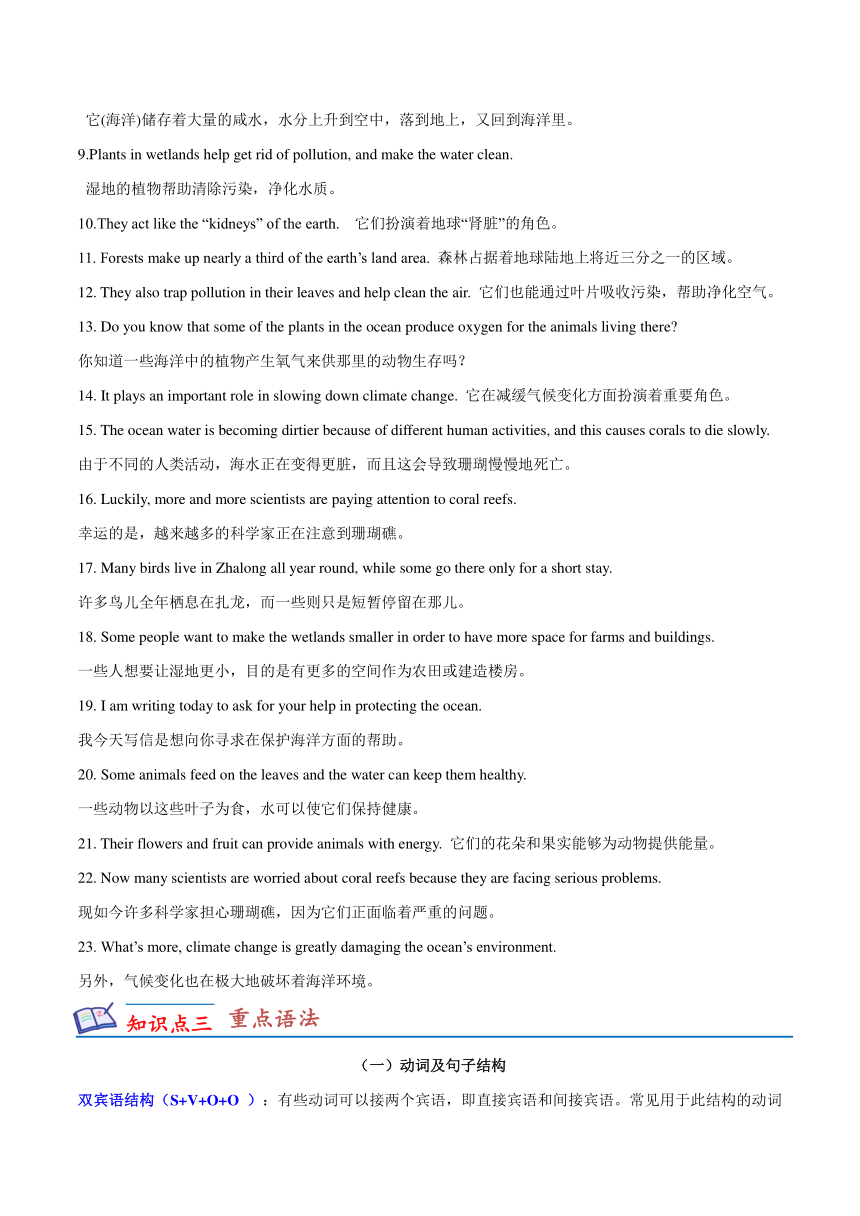
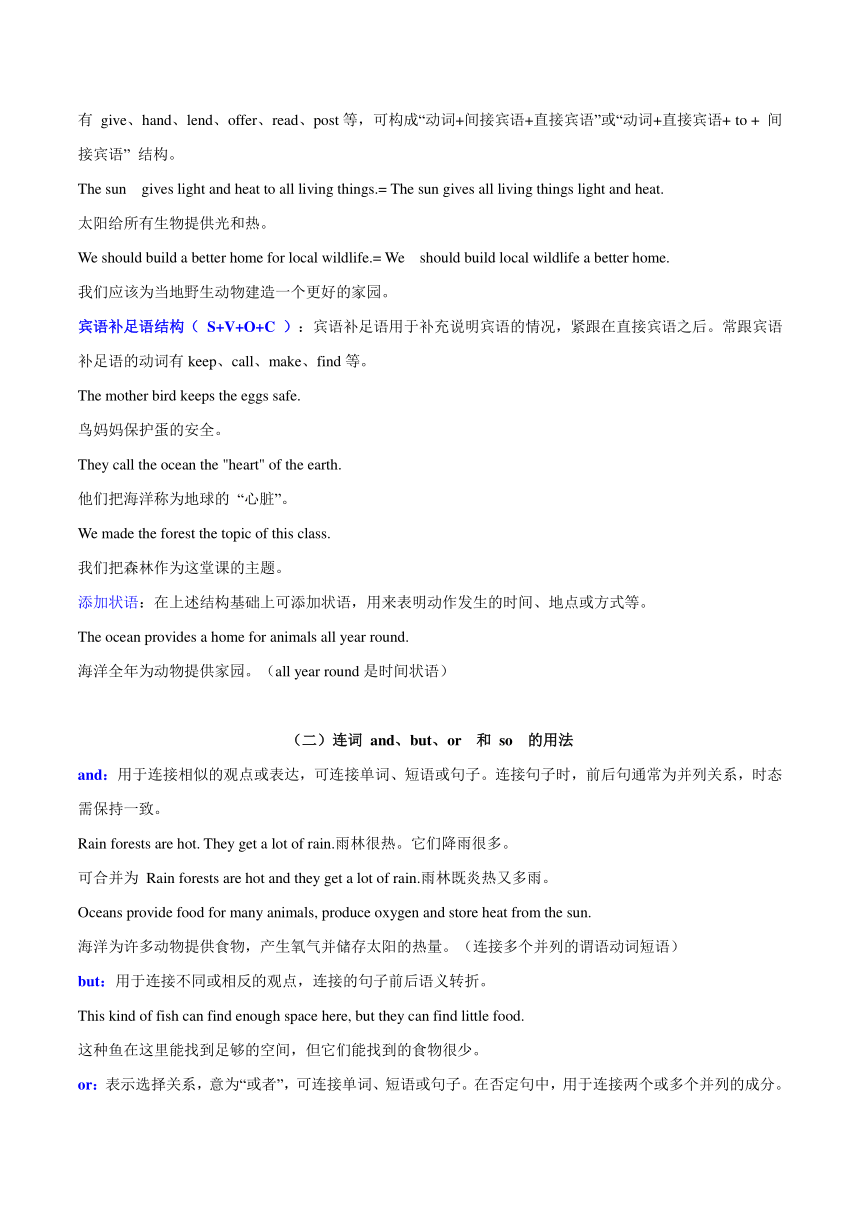
文档简介
Unit 7 The natural world 知识梳理
2025-2026学年八年级英语上册新课标(核心素养)同步大师课堂
(
重点单词与词语
) (
知识点一
)
一、重点单词
ecosystem / 'i:k s st m/n. 生态系统
rainforest / 're nf r st/n. 雨林;热带雨林
coral / 'k r l/n. 珊瑚
reef /ri:f/n. 礁;暗礁
grassland / 'ɡrɑ:sl nd/n. 草原;草地
desert / 'dez t/n. 沙漠;荒漠 /d 'z :t/v. 抛弃;遗弃;舍弃
polar / 'p l (r)/adj. 极地的;近极地的;磁极的
penguin / 'pe ɡw n/n. 企鹅
ocean / ' n/n. 海洋;大海
wetland / 'wetl nd/n. 湿地
forest / 'f r st/n. 森林
include / n 'klu:d/v. 包括;包含;使成为… …的一部分
surface / 's :f s/n. 表面;表层;外观 v. 浮出水面;显露
oxygen / ' ks d n/n. 氧气
plenty / 'plenti/n. 大量;充足;丰富 adj. 大量的;充足的 adv. 非常;充分
salt /s :It/n. 盐;食盐 adj. 含盐的;咸的 v. 加盐;用盐腌制
rise /ra z/v. 上升;升起;增加;提高 n. 上升;增加;加薪
return /r 't :n/v. 返回;归还;恢复 n. 返回;归还;回报
kidney / 'k dni/n. 肾;肾脏
carbon / 'kɑ:b n/n. 碳;复写纸
dioxide /da ' ksa d/n. 二氧化物
trap /tr p/v. 使陷入困境;捕获;收集;使… … 无法逸出 n. 陷阱;圈套;困境
support /s 'p :t/v. 支持;支撑;养活;证实 n. 支持;支撑;帮助;支撑物
planet / 'pl n t/n. 行星
surface / 's :f s/n. 表面;表层;外观 v. 浮出水面;显露(重复,强化记忆)
store /st :(r)/v. 储存;贮藏;保存 n. 商店;店铺;仓库
prevent /pr 'vent/v. 预防;防止;阻止
flood /fl d/n. 洪水;水灾 v. 淹没;泛滥;大量涌入
sponge /sp nd /n. 海绵;海绵状物 v. 用海绵擦拭;吸收
lung /l /n. 肺;肺部
cover / 'k v (r)/v. 覆盖;遮盖;包含;足以支付 n. 封面;盖子;掩护
area / 'e ri /n. 地区;区域;面积;领域
produce /pr 'dju:s/v. 生产;制造;产生;引起 / 'pr dju:s/n. 产品;农产品
balance / 'b l ns/n. 平衡;均衡;天平 v. 使平衡;权衡;抵消
重点短语
be home to:是… … 的家园;为… … 的栖息地
lie between... and...:位于… … 和… … 之间
make up:组成;构成;编造;化妆;弥补
a lot of / lots of:许多;大量(可修饰可数名词复数和不可数名词)
keep the balance:保持平衡
get rid of:摆脱;除去;处理掉
prevent... from...:阻止… … 做某事;防止… … 发生
take in:吸收;吸入;理解;欺骗;收留
call... the... of...:把… … 称为… … 的… …
be worried about:为… … 担心;担忧
make efforts to do sth.:努力做某事
in order to:为了(后接动词原形,表示目的)
lead to:导致;通向
keep doing sth.:继续做某事;一直做某事
make laws to do sth.:制定法律做某事
work with:与… … 合作;从事… … 工作
encourage sb. to do sth.:鼓励某人做某事(已出现,强化记忆)
tell sb. how to do sth.:告诉某人如何做某事
join an environmental group:加入环保组织
work as a volunteer:做志愿者工作
clean up the beach:清理海滩
use environment - friendly products:使用环保产品
save the wetlands:拯救湿地
stop sb. from doing sth.:阻止某人做某事(与 prevent... from... 类似,已出现相关表达,强化记忆)
reduce the number of:减少… … 的数量
keep... free from:使… … 免受;使… … 免于
make sure:确保;务必(后接从句或 of 短语)
plant trees:植树
(
重点句型
) (
知识点二
)ask sb. to do sth.:要求某人做某事;请求某人做某事
1. To treat kindly the earth is to treat kindly oneself.友善地对待地球就是友善地对待自己。
2. Coral reefs look like rocks, but they support a lot of life in just a small area.
珊瑚礁看起来像岩石,但它们在一片小小的区域维持着大量的生命。
3. The polar ice is home to animals like polar bears and penguins.
极地的冰是像北极熊和企鹅这样的动物的家园。
4. And the difference in temperature between day and night is huge. 而且早晚的温差是巨大的。
5.The climate in deserts is so awful that only a few animals and plants can live there.
沙漠的气候如此可怕以至于只有少量动物和植物能在那里生存。
6. The desert plants keep water in their leaves and many animals there get water from these plants.
这些沙漠植物在它们的叶子里储存水分,许多那里的动物从这些植物中获取水分。
7. Each ecosystem has a role to play and helps keep the balance between all its members and the greater environment.
每个生态系统都发挥作用,并且帮助保持其所有成员和更大环境之间的平衡。
8. It holds plenty of salt water, and the water rises to the sky, falls onto the lands and then returns to the ocean.
它(海洋)储存着大量的咸水,水分上升到空中,落到地上,又回到海洋里。
9.Plants in wetlands help get rid of pollution, and make the water clean.
湿地的植物帮助清除污染,净化水质。
10.They act like the “kidneys” of the earth. 它们扮演着地球“肾脏”的角色。
11. Forests make up nearly a third of the earth’s land area. 森林占据着地球陆地上将近三分之一的区域。
12. They also trap pollution in their leaves and help clean the air. 它们也能通过叶片吸收污染,帮助净化空气。
13. Do you know that some of the plants in the ocean produce oxygen for the animals living there
你知道一些海洋中的植物产生氧气来供那里的动物生存吗?
14. It plays an important role in slowing down climate change. 它在减缓气候变化方面扮演着重要角色。
15. The ocean water is becoming dirtier because of different human activities, and this causes corals to die slowly.
由于不同的人类活动,海水正在变得更脏,而且这会导致珊瑚慢慢地死亡。
16. Luckily, more and more scientists are paying attention to coral reefs.
幸运的是,越来越多的科学家正在注意到珊瑚礁。
17. Many birds live in Zhalong all year round, while some go there only for a short stay.
许多鸟儿全年栖息在扎龙,而一些则只是短暂停留在那儿。
18. Some people want to make the wetlands smaller in order to have more space for farms and buildings.
一些人想要让湿地更小,目的是有更多的空间作为农田或建造楼房。
19. I am writing today to ask for your help in protecting the ocean.
我今天写信是想向你寻求在保护海洋方面的帮助。
20. Some animals feed on the leaves and the water can keep them healthy.
一些动物以这些叶子为食,水可以使它们保持健康。
21. Their flowers and fruit can provide animals with energy. 它们的花朵和果实能够为动物提供能量。
22. Now many scientists are worried about coral reefs because they are facing serious problems.
现如今许多科学家担心珊瑚礁,因为它们正面临着严重的问题。
23. What’s more, climate change is greatly damaging the ocean’s environment.
(
重点语法
)另外,气候变化也在极大地破坏着海洋环境。
(
知识点三
)
(一)动词及句子结构
双宾语结构(S+V+O+O ):有些动词可以接两个宾语,即直接宾语和间接宾语。常见用于此结构的动词有 give、hand、lend、offer、read、post等,可构成“动词+间接宾语+直接宾语”或“动词+直接宾语+ to + 间接宾语” 结构。
The sun gives light and heat to all living things.= The sun gives all living things light and heat.
太阳给所有生物提供光和热。
We should build a better home for local wildlife.= We should build local wildlife a better home.
我们应该为当地野生动物建造一个更好的家园。
宾语补足语结构( S+V+O+C ):宾语补足语用于补充说明宾语的情况,紧跟在直接宾语之后。常跟宾语补足语的动词有keep、call、make、find等。
The mother bird keeps the eggs safe.
鸟妈妈保护蛋的安全。
They call the ocean the "heart" of the earth.
他们把海洋称为地球的 “心脏”。
We made the forest the topic of this class.
我们把森林作为这堂课的主题。
添加状语:在上述结构基础上可添加状语,用来表明动作发生的时间、地点或方式等。
The ocean provides a home for animals all year round.
海洋全年为动物提供家园。(all year round是时间状语)
(二)连词 and、but、or 和 so 的用法
and:用于连接相似的观点或表达,可连接单词、短语或句子。连接句子时,前后句通常为并列关系,时态需保持一致。
Rain forests are hot. They get a lot of rain.雨林很热。它们降雨很多。
可合并为 Rain forests are hot and they get a lot of rain.雨林既炎热又多雨。
Oceans provide food for many animals, produce oxygen and store heat from the sun.
海洋为许多动物提供食物,产生氧气并储存太阳的热量。(连接多个并列的谓语动词短语)
but:用于连接不同或相反的观点,连接的句子前后语义转折。
This kind of fish can find enough space here, but they can find little food.
这种鱼在这里能找到足够的空间,但它们能找到的食物很少。
or:表示选择关系,意为“或者”,可连接单词、短语或句子。在否定句中,用于连接两个或多个并列的成分。Birds can live in the forest or in the wetland.
鸟类可以生 活在森林里或者湿地里。
The deep ocean isn't warm, bright or noisy.
深海既不温暖,也不明亮,也不喧闹。
so:表示结果,意为 “所以;因此”,连接的句子中,前句是原因,后句是结果。
Deserts are dry, so some plants keep water in their leaves.
沙漠很干燥,所以一些植物把 水储存在叶子里。
(三)后缀 -ly
构成副词:
①加在形容词后,通常构成副词,用于修饰动词、形容词或其他副词,表示方式、程度、时间等。
real(真的)- really(真正地)
slow(慢的)- slowly(慢慢地)
②部分以-y结尾的形容词,变副词时要把 y变为i,再加-ly,
happy(高兴 的)- happily(高兴地)
构成形容词:
①也可加在一些名词后构成形容词。
friend(朋友)- friendly(友好 的)
month(月)- monthly(每月的)
week(周)- weekly(每周的)
day(天)- daily(每日的)
live(生活;居住)- lively(活泼的;充满生机的)
(
知识点四
) (
重点知识
)dead(死的)- deadly(致命的) 。
1、include / n'klu d/ vt. 包括
The school includes 30 teachers and 500 students.
这所学校包括30 名老师和500 名学生。
Her hobbies include music and painting.
她的爱好包括音乐和绘画。
There are all kinds of animals in the zoo, including bears, lions and so on.
动物园里有许多种动物,包括熊、狮子等。
A visit to Beijing must be included in our plan.
参观北京必须列入我们的计划。
【归纳拓展】
include 作动词,意为“包括;包含”,强调一个整体包含着若干个独立部分,或者一个东西包含着另一个东西的一部分。
including 是include 的动名词形式,但通常独立用作介词,意为“包括……在内”,常和前面的内容用逗号隔开。
include... in 是一个动词短语,意为“把……包括在内”。
2、around / 'ra nd/ adv. 大约
It took me around an hour to finish my homework.
我花了大约一个小时完成作业。
A big tree might make around 100kg of O2 every year.
一棵大树一年能够产生大约100 公斤氧气。
The children are playing around the garden.
孩子们在花园周围玩耍。
【归纳拓展】
around 作副词,意为“大约”,用于表示数量、时间、年龄等的不确切或近似数。
around 还可以作介词,意为“在……周围”。
look around 意为“环视;向四周看”。
3、hold /h ld/ vt. 容纳;拿着;举行
The room can hold 200 people.
这个房间可以容纳200 人。
He held a pen in one hand and a ruler in the other.
他一只手拿着钢笔另一只手拿着尺子。
We’ll hold a sports meeting next week.
下周我们要举行运动会。
The roof couldn’t hold the weight of snow.
屋顶承载不了雪的重量。
Hold on, please. I’ll get my friend.
请别挂断,我去叫我的朋友。
They decided to hold off the meeting until next Sunday.
他们决定把会议推迟到下个星期天。
【归纳拓展】
hold 作动词,有以下几种意义:
1) 容纳:指某个空间的大小能装下一些人或物;
2) 拿着:指用手拿着某些物品;
3) 举行:指举行会议或活动;
4) 承载、支撑:指承载某种物体的重量。
hold on 别挂断电话;稍等 hold off = put off 推迟
4、return /r 't n/ vi. 返回,回去,回来
He returned to his hometown after many years.
多年以后他返回了家乡。
You must return the book to the library before Monday.
周一以前你必须把书还给图书馆。
He returned to good health after a long illness.
长时间的疾病后,他恢复了健康。
What can I do in return for your kindness
我怎样做才能回报你的好意呢?
【归纳拓展】
return 作动词,意为“返回”,常用短语:return to +地点,意为“返回某地”。
return 还可以表示“归还”,构成短语:return sth. to sb. 把某物归还给某人
in return 作为回报
5、prevent /pr 'vent/ vt. 防止,阻止
The government are taking action to prevent pollution.
政府正在采取措施防止污染。
We tried to prevent him, but we failed.
我们试图阻止他,可是没有成功。
The rain prevented us from going out to play.
雨阻止了我们外出玩耍。
【归纳拓展】
prevent 作动词,意为“防止,阻止”,后面可以直接加名词或代词作宾语。
prevent sb. from doing sth. 是其常用短语,意为“阻止某人做某事”。
6、store /st (r)/ vt. 贮存
The pond stores much rainwater in summer.
这个池塘夏天储存很多雨水。
The little squirrel stores up food in a tree hole in winter.
冬天小松鼠把食物存在一个树洞里。
You can see a book store across from the bank.
在银行对面你可以看到一家书店。
I went to the store to buy some groceries.
我去商店买了一些杂货。
【归纳拓展】
store 作动词,意为“贮存;存储”,后面可以直接接名词作宾语。store up 意为“储存;积累”。
store 还可以作名词,意为“商店;仓库”。
7、act / kt/ vi. 起作用;行动 vi. & vt. 扮演
The medicine acts mainly on the central nervous system.
这种药主要作用于中枢神经系统。
We need to act quickly to solve the problem.
我们需要立即行动来解决问题。
The new student acts very well in class.
那个新生在班里表现很好。
The government must take action to prevent pollution.
政府必须采取措施制止污染。
He acted the part of a doctor in the TV play.
在那部电视剧中他扮演了医生的角色。
She acted as the team leader during the match.
比赛期间她担任队长。
【归纳拓展】
act 可以作不及物动词,意为“起作用;行动”,也可以作及物动词,意为“扮演”,主要表示以下意义:
1)起作用:表示某种东西或话语对另一种东西或某人产生影响;
2)行动:表示采取行动来解决问题或实现目标;
3)表现:表示人的行为方式,描述人的举止或态度;
4)扮演:表示在戏剧或电影中扮演某个角色。
take action 采取行动 act like 表现得像……
act as 充当;担任 act out 表演出来
8、harm /hɑ m/ vt. & n. 伤害,损害
Running too much may harm your knees.
跑步过多可能伤害你的膝盖。
Reading in the sun does harm to your eyes.
在阳光下读书对你的眼睛有害。
Smoking harms our health. 吸烟有害我们的健康。
Smoking is harmful to our health. 吸烟有害我们的健康
【归纳拓展】
harm可以作动词或名词,意为“伤害;损害”,其形容词形式是harmful,意为“有害的”。
do harm to 意为“对……有害”,此时harm 是名词;
be harmful to 意为“对……有害”。两个短语后面都接名词或代词宾格作宾语。
9、get rid of 清除;摆脱
You must get rid of your bad habit of getting up late.
你必须改掉晚起的坏习惯。
The cleaners are getting rid of the snow on the road.
清洁工正在清除路上的积雪。
The hunter wanted to get rid of the wolf, but he couldn’t.
猎人想要摆脱那头狼,但是他不能。
John decided to get rid of his old books.
约翰决定清理他的旧书。
【归纳拓展】
get rid of 意为“清除;摆脱;丢弃”,表示清除某种不良影响;摆脱某人或某种困境;丢弃不想要的物品等。
10、make up 占据(某种比例)
Women teachers make up a half of the teachers
in this school. 女教师占据了本校教师的一半。
The teacher made up a funny story for his new lesson.
老师为他的新课编了一个有趣的故事。
We need two more players to make up a soccer team.
我们还需要两名队员来组成足球队。
She spends too much time making up in the morning.
早上她花太多时间来化妆。
【归纳拓展】
make up 的意思主要有:
1) 占据总量中的一定分量;
2) 编造故事或借口;
3) 组成(一个集体或团队);
4) 化妆;打扮。
11、millions of 数以百万计的
You can see millions of stars in the sky at night.
晚上在天空中你会看到数以百万计的星星。
There are about two million people in this city.
这座城市大约有200 万人。
Thousands of tourists come to Beijing every year.
每年成千上万的游客来北京。
In summer, you can see hundreds of ducks on the river.
夏天,在河面上你会看到成百上千的鸭子。
【归纳拓展】
hundred (百)、thousand (千)、million (百万) 都是表示数量的词,它们的用法是:
表示具体数量时不使用复数,表示笼统数量时要使用复数,且后面要加介词of。
12、noisy /'n zi/ adj. 充满噪声的;吵闹的
The street outside our school is very noisy.
我们学校外面的街道很吵。
Look at the noisy children. Ask them to play outside.
看那些吵闹的孩子。让他们到外面去玩。
The party was too noisy for me, with too many people and loud music.
聚会对我来说太吵,人太多,音乐太响
You can’t make noise here. The baby is sleeping.
你们不能在这里制造噪音,婴儿在睡觉。
【归纳拓展】
noisy 是形容词,由名词noise 变化而来。主要表达以下几种意思:
1) 噪音大或喧闹的;
2) 指环境或事物发出噪音;
3) 指人的话太多或活动过多;
4) 描述过于复杂或混乱的场景。
13、too much 太多
Don’t spend too much time on your smart phone.
不要在手机上花费太多时间。
Don’t play games too much.
不要玩太多游戏。
It’s much too cold today. Let’s stay at home.
今天太冷了。我们待在家里吧。
There are too many people on the bus. It’s very crowded.
公交车上人太多了。非常拥挤。
辨析: too much, much too与too many
too much 意为“太多”,修饰不可数名词,表达数量多。也可修饰动词或整个句子,表示“过分地”。
much too 意为“太……”,修饰形容词或副词,表示程度大。
too many 意为“太多”,修饰可数名词复数,表示数量多。
14、quite a few 相当多,不少
Quite a few students took part in the sports meeting.
相当多的学生参加了运动会。
You can see quite a few books on the shelf.
在书架上你能看到相当多的书。
【归纳拓展】
quite a few 表示存在一定数量的人或物,这个数量比a few 要多,但还没有达到many 的程度。其后面要使用可数名词复数。
15、cause /k z/ vt. 使发生,造成,导致 n. 原因;理由
The heavy rain caused a flood in the city.
大雨导致了城市里面的洪水。
The mistake has caused me a lot of trouble.
这个错误给我带来了很多麻烦。
The cold weather caused the plants to die.
寒冷的天气使植物死亡。
【归纳拓展】
cause 作动词,意为“使发生,造成,导致”,通常接名词或名词短语作宾语,表示某种结果;
cause sb. sth. 给某人造成某物(通常指不好的结果)
cause +宾语+不定式,促使/ 导致某人/ 某物做某事
cause 作名词,意为“原因;理由”。
16、damage /'d m d / vt. 损害,毁坏 n. 损坏,损失;损害
Smoking can damage your health.
吸烟会损害你的健康。
The storm damaged quite a few houses.
暴风雨毁坏了相当多的房子。
The earthquake caused a lot of damage to the city.
地震给这座城市带来了巨大破坏。
What you said caused great damage to her.
你说的话对她伤害极大。
【归纳拓展】
damage 既可以作动词,也可以作名词,意为“损害;毁坏;破坏”,可以指有形的物体损害,也可以指无形的损失,如财产或精神等。
cause damage to sb./ sth. 对某人或某物造成损害
17、be worried about 担心……
She is worried about her son because he came home late.
她担心她的儿子,因为他回家晚了。
The girl was worried about seeing her new teacher.
那个女孩担心看到她的新老师。
Parents always worry about their children.
父母总是为自己的孩子担忧。
She is anxious about her lessons. 她对自己的课程感到焦虑。
【归纳拓展】
be worried about 是一个系表结构的短语,相当于一个及物动词词组,后面接名词或代词作宾语,表达对某事物或人的担忧或忧虑。about 是介词,如果后面出现动词,要使用动名词形式。
be worried about 的同义短语是be anxious about“对……感到焦虑”,be 动词要根据时态和主语变化形式。
18、because of 因为
He didn’t go to school because of his illness.
他因病没有去上学。
It’s all because of what you said.
那完全是因为你说的话。
He was late for work because of helping an old man.
他因为帮助一位老人而上班迟到了。
I stayed at home because I was too tired.
我待在家里,因为我太累了。
辨析: because 与because of
because because 是连词,用于连接一个完整的句子,包括主语和谓语,表示原因。
because of because of 是介词短语,后接名词、人称代词宾格或what 从句,后面出现动词时要使用动名词形式。
19、cover /'k v (r)/ n. 躲避处;罩子
Grass provides cover for small animals, like rabbits.
草为小动物如兔子提供躲避处。
The book has a beautiful cover.
这本书有漂亮的封面。
He bought a cover for his old pot.
他为他的旧锅买了一个盖子。
Don’t cover your face when you are sleeping.
睡觉时不要把你的脸蒙上。
He tried to cover his mistakes.
他试图掩盖他的错误。
【归纳拓展】
cover 是个兼义词,主要意思有:
1)名词,躲避处,指提供掩护或保护的地方;
2)名词,封面、封皮,指书籍、杂志等的封面;
3)名词,罩子、套子,指容器的上盖等;
4)动词,遮盖;覆盖,指用某物覆盖或隐藏另一物体;
5)动词,掩盖;遮掩,表示隐藏或掩饰某种情况。
be covered with 被……覆盖
20、lead /li d/ vi. 造成(后果)
Poor eating habits can lead to health problems.
不良的饮食习惯可能导致健康问题。
He leads the team in the project.
他在这个项目中领导团队。
Who is the leader of your soccer team
谁是你们足球队的队长?
【归纳拓展】
lead 可以作及物动词,意为“引领;带路”,作不及物动词,意为“导致”,表示由于某种原因出现某种不太好的情况。
lead 的过去式是led。
leader 是lead 的名词,意为“领导者”。
21、create /kri'e t/ vt. 创建,创造
We should create a better future for the children.
我们应当为孩子们创造一个更好的未来。
She created a beautiful painting.
她创作了一幅美丽的画。
She has a very creative mind.
她有一个非常有创意的头脑。
The boy is full of creativity. You never know what he is thinking.
这个男孩很有创造力。你永远不知道他在想什么。
【归纳拓展】
create 作动词,意为“创建,创造”,常用作及物动词,
后面接名词或名词短语作宾语,表示创造出具体的事物。
create 的形容词形式是creative,意为“有创造性的”。
creativity 是名词,意为“创造力;创造性”,通常用作不可数名词。
22、solve /s lv/ vt. 解决;解答
She solved the math problem in just a few minutes.
她仅在几分钟内解决了这个数学问题。
I think nobody can solve the mystery.
我认为没有人能解开这个谜团。
Let’s ask our math teacher to solve the equation.
我们去让数学老师解这个方程吧。
I can’t solve the riddle. Can you help me
我解不开这个谜语。你能帮我吗?
【归纳拓展】
solve 是及物动词,意为“解决;解答”,通常用于处理问题、谜团、方程等。solve 的同义短语是work out。
solve a problem 解决问题 solve a mystery 解开谜团
solve an equation 解方程 solve a riddle 解开谜语
23、in order to 为了
We started early in order to catch the first bus.
我们早早出发为了赶上第一班公交车。
We started early in order that we could catch the first bus.
我们早早出发以便我们能赶上第一班公交车。
She got up quietly in order not to wake up the baby.
她悄悄起床为了不吵醒宝宝。
He studied hard so that he could pass the exam.
他努力学习以便能通过考试。
【归纳拓展】
in order to 意为“为了”,用于引导目的状语,后面使用动词原形。在句子中可以放在句首或句中,在句首时要用逗号隔开。其否定形式是in order not to,意为“为了不……”。
in order that 和so that 都和in order to 意思相同,不过它们的后面要使用从句,不能接动词原形。
the number of... ……的数量
The number of the students in our class is 40.
我们班的学生数量是40.
A number of tourists are on the beach.
沙滩上有大量的游客。
辨析: a number of 与the number of
a number of 意为“许多、大量”,后接复数名词或代词,number 前可用large、small 等词来修饰,表示程度大小。“a number of + 复数名词/ 复数代词”作主语时,谓语动词用复数。
the number of 意为“……的数量”,后接复数名词或代词,强调人或物体的数量。“the number of + 复数名词/ 复数代词”作主语时,谓语动词用单数。
24、set up 建立
They set up a small company last year.
去年他们成立了一个小公司。
Let’s set up a meeting for the next week.
我们为下周开个会吧。
These are the tents for the camping. Please set them up.
这些是露营的帐篷。请把它们搭起来。
【归纳拓展】
set up 是一个“动词+ 副词”型短语,名词作宾语通常放在后面,代词it 或them 作宾语要放在两个词的中间。它的意思有:
1)建立或创建,表示组建公司、组织、团队等;
2)安排或准备,表示对会议、活动等进行先期筹备;
3)搭起或搭建,表示简单地搭起舞台、房屋、帐篷等。
25、It is meaningful to join an environmental group and work as a volunteer. 加入环保组织并且作一名志愿者是很有意义的。
(分析结构) 这是一个简单句,句子是主系表结构,时态是一般现在时。It 是形式主语,is 是系动词,meaningful是表语,其后的不定式是真正的主语。
It’s very kind of you to help us.
你能帮助我们真是太好了。
It’s not very easy to study English well.
学好英语是不太容易的。
It’s impossible for us to finish the work in a week.
对于我们来说一个星期内完成工作是不可能的。
【归纳拓展】
It’s + adj. + (for sb.) to do sth. 是一种常用结构,意为“(对某人来说)做某事……”.
It 是形式主语,真正的主语是后面的动词不定式。因为动词不定式结构稍长,放在句首会让句子显得头重脚轻,故使用形式主语It,而把动词不定式后移。
如果句中的形容词描述的是后面所做事情的特点,要使用介词for;如果形容词描述的是后面人的特点,则使用介词of。
2025-2026学年八年级英语上册新课标(核心素养)同步大师课堂
(
重点单词与词语
) (
知识点一
)
一、重点单词
ecosystem / 'i:k s st m/n. 生态系统
rainforest / 're nf r st/n. 雨林;热带雨林
coral / 'k r l/n. 珊瑚
reef /ri:f/n. 礁;暗礁
grassland / 'ɡrɑ:sl nd/n. 草原;草地
desert / 'dez t/n. 沙漠;荒漠 /d 'z :t/v. 抛弃;遗弃;舍弃
polar / 'p l (r)/adj. 极地的;近极地的;磁极的
penguin / 'pe ɡw n/n. 企鹅
ocean / ' n/n. 海洋;大海
wetland / 'wetl nd/n. 湿地
forest / 'f r st/n. 森林
include / n 'klu:d/v. 包括;包含;使成为… …的一部分
surface / 's :f s/n. 表面;表层;外观 v. 浮出水面;显露
oxygen / ' ks d n/n. 氧气
plenty / 'plenti/n. 大量;充足;丰富 adj. 大量的;充足的 adv. 非常;充分
salt /s :It/n. 盐;食盐 adj. 含盐的;咸的 v. 加盐;用盐腌制
rise /ra z/v. 上升;升起;增加;提高 n. 上升;增加;加薪
return /r 't :n/v. 返回;归还;恢复 n. 返回;归还;回报
kidney / 'k dni/n. 肾;肾脏
carbon / 'kɑ:b n/n. 碳;复写纸
dioxide /da ' ksa d/n. 二氧化物
trap /tr p/v. 使陷入困境;捕获;收集;使… … 无法逸出 n. 陷阱;圈套;困境
support /s 'p :t/v. 支持;支撑;养活;证实 n. 支持;支撑;帮助;支撑物
planet / 'pl n t/n. 行星
surface / 's :f s/n. 表面;表层;外观 v. 浮出水面;显露(重复,强化记忆)
store /st :(r)/v. 储存;贮藏;保存 n. 商店;店铺;仓库
prevent /pr 'vent/v. 预防;防止;阻止
flood /fl d/n. 洪水;水灾 v. 淹没;泛滥;大量涌入
sponge /sp nd /n. 海绵;海绵状物 v. 用海绵擦拭;吸收
lung /l /n. 肺;肺部
cover / 'k v (r)/v. 覆盖;遮盖;包含;足以支付 n. 封面;盖子;掩护
area / 'e ri /n. 地区;区域;面积;领域
produce /pr 'dju:s/v. 生产;制造;产生;引起 / 'pr dju:s/n. 产品;农产品
balance / 'b l ns/n. 平衡;均衡;天平 v. 使平衡;权衡;抵消
重点短语
be home to:是… … 的家园;为… … 的栖息地
lie between... and...:位于… … 和… … 之间
make up:组成;构成;编造;化妆;弥补
a lot of / lots of:许多;大量(可修饰可数名词复数和不可数名词)
keep the balance:保持平衡
get rid of:摆脱;除去;处理掉
prevent... from...:阻止… … 做某事;防止… … 发生
take in:吸收;吸入;理解;欺骗;收留
call... the... of...:把… … 称为… … 的… …
be worried about:为… … 担心;担忧
make efforts to do sth.:努力做某事
in order to:为了(后接动词原形,表示目的)
lead to:导致;通向
keep doing sth.:继续做某事;一直做某事
make laws to do sth.:制定法律做某事
work with:与… … 合作;从事… … 工作
encourage sb. to do sth.:鼓励某人做某事(已出现,强化记忆)
tell sb. how to do sth.:告诉某人如何做某事
join an environmental group:加入环保组织
work as a volunteer:做志愿者工作
clean up the beach:清理海滩
use environment - friendly products:使用环保产品
save the wetlands:拯救湿地
stop sb. from doing sth.:阻止某人做某事(与 prevent... from... 类似,已出现相关表达,强化记忆)
reduce the number of:减少… … 的数量
keep... free from:使… … 免受;使… … 免于
make sure:确保;务必(后接从句或 of 短语)
plant trees:植树
(
重点句型
) (
知识点二
)ask sb. to do sth.:要求某人做某事;请求某人做某事
1. To treat kindly the earth is to treat kindly oneself.友善地对待地球就是友善地对待自己。
2. Coral reefs look like rocks, but they support a lot of life in just a small area.
珊瑚礁看起来像岩石,但它们在一片小小的区域维持着大量的生命。
3. The polar ice is home to animals like polar bears and penguins.
极地的冰是像北极熊和企鹅这样的动物的家园。
4. And the difference in temperature between day and night is huge. 而且早晚的温差是巨大的。
5.The climate in deserts is so awful that only a few animals and plants can live there.
沙漠的气候如此可怕以至于只有少量动物和植物能在那里生存。
6. The desert plants keep water in their leaves and many animals there get water from these plants.
这些沙漠植物在它们的叶子里储存水分,许多那里的动物从这些植物中获取水分。
7. Each ecosystem has a role to play and helps keep the balance between all its members and the greater environment.
每个生态系统都发挥作用,并且帮助保持其所有成员和更大环境之间的平衡。
8. It holds plenty of salt water, and the water rises to the sky, falls onto the lands and then returns to the ocean.
它(海洋)储存着大量的咸水,水分上升到空中,落到地上,又回到海洋里。
9.Plants in wetlands help get rid of pollution, and make the water clean.
湿地的植物帮助清除污染,净化水质。
10.They act like the “kidneys” of the earth. 它们扮演着地球“肾脏”的角色。
11. Forests make up nearly a third of the earth’s land area. 森林占据着地球陆地上将近三分之一的区域。
12. They also trap pollution in their leaves and help clean the air. 它们也能通过叶片吸收污染,帮助净化空气。
13. Do you know that some of the plants in the ocean produce oxygen for the animals living there
你知道一些海洋中的植物产生氧气来供那里的动物生存吗?
14. It plays an important role in slowing down climate change. 它在减缓气候变化方面扮演着重要角色。
15. The ocean water is becoming dirtier because of different human activities, and this causes corals to die slowly.
由于不同的人类活动,海水正在变得更脏,而且这会导致珊瑚慢慢地死亡。
16. Luckily, more and more scientists are paying attention to coral reefs.
幸运的是,越来越多的科学家正在注意到珊瑚礁。
17. Many birds live in Zhalong all year round, while some go there only for a short stay.
许多鸟儿全年栖息在扎龙,而一些则只是短暂停留在那儿。
18. Some people want to make the wetlands smaller in order to have more space for farms and buildings.
一些人想要让湿地更小,目的是有更多的空间作为农田或建造楼房。
19. I am writing today to ask for your help in protecting the ocean.
我今天写信是想向你寻求在保护海洋方面的帮助。
20. Some animals feed on the leaves and the water can keep them healthy.
一些动物以这些叶子为食,水可以使它们保持健康。
21. Their flowers and fruit can provide animals with energy. 它们的花朵和果实能够为动物提供能量。
22. Now many scientists are worried about coral reefs because they are facing serious problems.
现如今许多科学家担心珊瑚礁,因为它们正面临着严重的问题。
23. What’s more, climate change is greatly damaging the ocean’s environment.
(
重点语法
)另外,气候变化也在极大地破坏着海洋环境。
(
知识点三
)
(一)动词及句子结构
双宾语结构(S+V+O+O ):有些动词可以接两个宾语,即直接宾语和间接宾语。常见用于此结构的动词有 give、hand、lend、offer、read、post等,可构成“动词+间接宾语+直接宾语”或“动词+直接宾语+ to + 间接宾语” 结构。
The sun gives light and heat to all living things.= The sun gives all living things light and heat.
太阳给所有生物提供光和热。
We should build a better home for local wildlife.= We should build local wildlife a better home.
我们应该为当地野生动物建造一个更好的家园。
宾语补足语结构( S+V+O+C ):宾语补足语用于补充说明宾语的情况,紧跟在直接宾语之后。常跟宾语补足语的动词有keep、call、make、find等。
The mother bird keeps the eggs safe.
鸟妈妈保护蛋的安全。
They call the ocean the "heart" of the earth.
他们把海洋称为地球的 “心脏”。
We made the forest the topic of this class.
我们把森林作为这堂课的主题。
添加状语:在上述结构基础上可添加状语,用来表明动作发生的时间、地点或方式等。
The ocean provides a home for animals all year round.
海洋全年为动物提供家园。(all year round是时间状语)
(二)连词 and、but、or 和 so 的用法
and:用于连接相似的观点或表达,可连接单词、短语或句子。连接句子时,前后句通常为并列关系,时态需保持一致。
Rain forests are hot. They get a lot of rain.雨林很热。它们降雨很多。
可合并为 Rain forests are hot and they get a lot of rain.雨林既炎热又多雨。
Oceans provide food for many animals, produce oxygen and store heat from the sun.
海洋为许多动物提供食物,产生氧气并储存太阳的热量。(连接多个并列的谓语动词短语)
but:用于连接不同或相反的观点,连接的句子前后语义转折。
This kind of fish can find enough space here, but they can find little food.
这种鱼在这里能找到足够的空间,但它们能找到的食物很少。
or:表示选择关系,意为“或者”,可连接单词、短语或句子。在否定句中,用于连接两个或多个并列的成分。Birds can live in the forest or in the wetland.
鸟类可以生 活在森林里或者湿地里。
The deep ocean isn't warm, bright or noisy.
深海既不温暖,也不明亮,也不喧闹。
so:表示结果,意为 “所以;因此”,连接的句子中,前句是原因,后句是结果。
Deserts are dry, so some plants keep water in their leaves.
沙漠很干燥,所以一些植物把 水储存在叶子里。
(三)后缀 -ly
构成副词:
①加在形容词后,通常构成副词,用于修饰动词、形容词或其他副词,表示方式、程度、时间等。
real(真的)- really(真正地)
slow(慢的)- slowly(慢慢地)
②部分以-y结尾的形容词,变副词时要把 y变为i,再加-ly,
happy(高兴 的)- happily(高兴地)
构成形容词:
①也可加在一些名词后构成形容词。
friend(朋友)- friendly(友好 的)
month(月)- monthly(每月的)
week(周)- weekly(每周的)
day(天)- daily(每日的)
live(生活;居住)- lively(活泼的;充满生机的)
(
知识点四
) (
重点知识
)dead(死的)- deadly(致命的) 。
1、include / n'klu d/ vt. 包括
The school includes 30 teachers and 500 students.
这所学校包括30 名老师和500 名学生。
Her hobbies include music and painting.
她的爱好包括音乐和绘画。
There are all kinds of animals in the zoo, including bears, lions and so on.
动物园里有许多种动物,包括熊、狮子等。
A visit to Beijing must be included in our plan.
参观北京必须列入我们的计划。
【归纳拓展】
include 作动词,意为“包括;包含”,强调一个整体包含着若干个独立部分,或者一个东西包含着另一个东西的一部分。
including 是include 的动名词形式,但通常独立用作介词,意为“包括……在内”,常和前面的内容用逗号隔开。
include... in 是一个动词短语,意为“把……包括在内”。
2、around / 'ra nd/ adv. 大约
It took me around an hour to finish my homework.
我花了大约一个小时完成作业。
A big tree might make around 100kg of O2 every year.
一棵大树一年能够产生大约100 公斤氧气。
The children are playing around the garden.
孩子们在花园周围玩耍。
【归纳拓展】
around 作副词,意为“大约”,用于表示数量、时间、年龄等的不确切或近似数。
around 还可以作介词,意为“在……周围”。
look around 意为“环视;向四周看”。
3、hold /h ld/ vt. 容纳;拿着;举行
The room can hold 200 people.
这个房间可以容纳200 人。
He held a pen in one hand and a ruler in the other.
他一只手拿着钢笔另一只手拿着尺子。
We’ll hold a sports meeting next week.
下周我们要举行运动会。
The roof couldn’t hold the weight of snow.
屋顶承载不了雪的重量。
Hold on, please. I’ll get my friend.
请别挂断,我去叫我的朋友。
They decided to hold off the meeting until next Sunday.
他们决定把会议推迟到下个星期天。
【归纳拓展】
hold 作动词,有以下几种意义:
1) 容纳:指某个空间的大小能装下一些人或物;
2) 拿着:指用手拿着某些物品;
3) 举行:指举行会议或活动;
4) 承载、支撑:指承载某种物体的重量。
hold on 别挂断电话;稍等 hold off = put off 推迟
4、return /r 't n/ vi. 返回,回去,回来
He returned to his hometown after many years.
多年以后他返回了家乡。
You must return the book to the library before Monday.
周一以前你必须把书还给图书馆。
He returned to good health after a long illness.
长时间的疾病后,他恢复了健康。
What can I do in return for your kindness
我怎样做才能回报你的好意呢?
【归纳拓展】
return 作动词,意为“返回”,常用短语:return to +地点,意为“返回某地”。
return 还可以表示“归还”,构成短语:return sth. to sb. 把某物归还给某人
in return 作为回报
5、prevent /pr 'vent/ vt. 防止,阻止
The government are taking action to prevent pollution.
政府正在采取措施防止污染。
We tried to prevent him, but we failed.
我们试图阻止他,可是没有成功。
The rain prevented us from going out to play.
雨阻止了我们外出玩耍。
【归纳拓展】
prevent 作动词,意为“防止,阻止”,后面可以直接加名词或代词作宾语。
prevent sb. from doing sth. 是其常用短语,意为“阻止某人做某事”。
6、store /st (r)/ vt. 贮存
The pond stores much rainwater in summer.
这个池塘夏天储存很多雨水。
The little squirrel stores up food in a tree hole in winter.
冬天小松鼠把食物存在一个树洞里。
You can see a book store across from the bank.
在银行对面你可以看到一家书店。
I went to the store to buy some groceries.
我去商店买了一些杂货。
【归纳拓展】
store 作动词,意为“贮存;存储”,后面可以直接接名词作宾语。store up 意为“储存;积累”。
store 还可以作名词,意为“商店;仓库”。
7、act / kt/ vi. 起作用;行动 vi. & vt. 扮演
The medicine acts mainly on the central nervous system.
这种药主要作用于中枢神经系统。
We need to act quickly to solve the problem.
我们需要立即行动来解决问题。
The new student acts very well in class.
那个新生在班里表现很好。
The government must take action to prevent pollution.
政府必须采取措施制止污染。
He acted the part of a doctor in the TV play.
在那部电视剧中他扮演了医生的角色。
She acted as the team leader during the match.
比赛期间她担任队长。
【归纳拓展】
act 可以作不及物动词,意为“起作用;行动”,也可以作及物动词,意为“扮演”,主要表示以下意义:
1)起作用:表示某种东西或话语对另一种东西或某人产生影响;
2)行动:表示采取行动来解决问题或实现目标;
3)表现:表示人的行为方式,描述人的举止或态度;
4)扮演:表示在戏剧或电影中扮演某个角色。
take action 采取行动 act like 表现得像……
act as 充当;担任 act out 表演出来
8、harm /hɑ m/ vt. & n. 伤害,损害
Running too much may harm your knees.
跑步过多可能伤害你的膝盖。
Reading in the sun does harm to your eyes.
在阳光下读书对你的眼睛有害。
Smoking harms our health. 吸烟有害我们的健康。
Smoking is harmful to our health. 吸烟有害我们的健康
【归纳拓展】
harm可以作动词或名词,意为“伤害;损害”,其形容词形式是harmful,意为“有害的”。
do harm to 意为“对……有害”,此时harm 是名词;
be harmful to 意为“对……有害”。两个短语后面都接名词或代词宾格作宾语。
9、get rid of 清除;摆脱
You must get rid of your bad habit of getting up late.
你必须改掉晚起的坏习惯。
The cleaners are getting rid of the snow on the road.
清洁工正在清除路上的积雪。
The hunter wanted to get rid of the wolf, but he couldn’t.
猎人想要摆脱那头狼,但是他不能。
John decided to get rid of his old books.
约翰决定清理他的旧书。
【归纳拓展】
get rid of 意为“清除;摆脱;丢弃”,表示清除某种不良影响;摆脱某人或某种困境;丢弃不想要的物品等。
10、make up 占据(某种比例)
Women teachers make up a half of the teachers
in this school. 女教师占据了本校教师的一半。
The teacher made up a funny story for his new lesson.
老师为他的新课编了一个有趣的故事。
We need two more players to make up a soccer team.
我们还需要两名队员来组成足球队。
She spends too much time making up in the morning.
早上她花太多时间来化妆。
【归纳拓展】
make up 的意思主要有:
1) 占据总量中的一定分量;
2) 编造故事或借口;
3) 组成(一个集体或团队);
4) 化妆;打扮。
11、millions of 数以百万计的
You can see millions of stars in the sky at night.
晚上在天空中你会看到数以百万计的星星。
There are about two million people in this city.
这座城市大约有200 万人。
Thousands of tourists come to Beijing every year.
每年成千上万的游客来北京。
In summer, you can see hundreds of ducks on the river.
夏天,在河面上你会看到成百上千的鸭子。
【归纳拓展】
hundred (百)、thousand (千)、million (百万) 都是表示数量的词,它们的用法是:
表示具体数量时不使用复数,表示笼统数量时要使用复数,且后面要加介词of。
12、noisy /'n zi/ adj. 充满噪声的;吵闹的
The street outside our school is very noisy.
我们学校外面的街道很吵。
Look at the noisy children. Ask them to play outside.
看那些吵闹的孩子。让他们到外面去玩。
The party was too noisy for me, with too many people and loud music.
聚会对我来说太吵,人太多,音乐太响
You can’t make noise here. The baby is sleeping.
你们不能在这里制造噪音,婴儿在睡觉。
【归纳拓展】
noisy 是形容词,由名词noise 变化而来。主要表达以下几种意思:
1) 噪音大或喧闹的;
2) 指环境或事物发出噪音;
3) 指人的话太多或活动过多;
4) 描述过于复杂或混乱的场景。
13、too much 太多
Don’t spend too much time on your smart phone.
不要在手机上花费太多时间。
Don’t play games too much.
不要玩太多游戏。
It’s much too cold today. Let’s stay at home.
今天太冷了。我们待在家里吧。
There are too many people on the bus. It’s very crowded.
公交车上人太多了。非常拥挤。
辨析: too much, much too与too many
too much 意为“太多”,修饰不可数名词,表达数量多。也可修饰动词或整个句子,表示“过分地”。
much too 意为“太……”,修饰形容词或副词,表示程度大。
too many 意为“太多”,修饰可数名词复数,表示数量多。
14、quite a few 相当多,不少
Quite a few students took part in the sports meeting.
相当多的学生参加了运动会。
You can see quite a few books on the shelf.
在书架上你能看到相当多的书。
【归纳拓展】
quite a few 表示存在一定数量的人或物,这个数量比a few 要多,但还没有达到many 的程度。其后面要使用可数名词复数。
15、cause /k z/ vt. 使发生,造成,导致 n. 原因;理由
The heavy rain caused a flood in the city.
大雨导致了城市里面的洪水。
The mistake has caused me a lot of trouble.
这个错误给我带来了很多麻烦。
The cold weather caused the plants to die.
寒冷的天气使植物死亡。
【归纳拓展】
cause 作动词,意为“使发生,造成,导致”,通常接名词或名词短语作宾语,表示某种结果;
cause sb. sth. 给某人造成某物(通常指不好的结果)
cause +宾语+不定式,促使/ 导致某人/ 某物做某事
cause 作名词,意为“原因;理由”。
16、damage /'d m d / vt. 损害,毁坏 n. 损坏,损失;损害
Smoking can damage your health.
吸烟会损害你的健康。
The storm damaged quite a few houses.
暴风雨毁坏了相当多的房子。
The earthquake caused a lot of damage to the city.
地震给这座城市带来了巨大破坏。
What you said caused great damage to her.
你说的话对她伤害极大。
【归纳拓展】
damage 既可以作动词,也可以作名词,意为“损害;毁坏;破坏”,可以指有形的物体损害,也可以指无形的损失,如财产或精神等。
cause damage to sb./ sth. 对某人或某物造成损害
17、be worried about 担心……
She is worried about her son because he came home late.
她担心她的儿子,因为他回家晚了。
The girl was worried about seeing her new teacher.
那个女孩担心看到她的新老师。
Parents always worry about their children.
父母总是为自己的孩子担忧。
She is anxious about her lessons. 她对自己的课程感到焦虑。
【归纳拓展】
be worried about 是一个系表结构的短语,相当于一个及物动词词组,后面接名词或代词作宾语,表达对某事物或人的担忧或忧虑。about 是介词,如果后面出现动词,要使用动名词形式。
be worried about 的同义短语是be anxious about“对……感到焦虑”,be 动词要根据时态和主语变化形式。
18、because of 因为
He didn’t go to school because of his illness.
他因病没有去上学。
It’s all because of what you said.
那完全是因为你说的话。
He was late for work because of helping an old man.
他因为帮助一位老人而上班迟到了。
I stayed at home because I was too tired.
我待在家里,因为我太累了。
辨析: because 与because of
because because 是连词,用于连接一个完整的句子,包括主语和谓语,表示原因。
because of because of 是介词短语,后接名词、人称代词宾格或what 从句,后面出现动词时要使用动名词形式。
19、cover /'k v (r)/ n. 躲避处;罩子
Grass provides cover for small animals, like rabbits.
草为小动物如兔子提供躲避处。
The book has a beautiful cover.
这本书有漂亮的封面。
He bought a cover for his old pot.
他为他的旧锅买了一个盖子。
Don’t cover your face when you are sleeping.
睡觉时不要把你的脸蒙上。
He tried to cover his mistakes.
他试图掩盖他的错误。
【归纳拓展】
cover 是个兼义词,主要意思有:
1)名词,躲避处,指提供掩护或保护的地方;
2)名词,封面、封皮,指书籍、杂志等的封面;
3)名词,罩子、套子,指容器的上盖等;
4)动词,遮盖;覆盖,指用某物覆盖或隐藏另一物体;
5)动词,掩盖;遮掩,表示隐藏或掩饰某种情况。
be covered with 被……覆盖
20、lead /li d/ vi. 造成(后果)
Poor eating habits can lead to health problems.
不良的饮食习惯可能导致健康问题。
He leads the team in the project.
他在这个项目中领导团队。
Who is the leader of your soccer team
谁是你们足球队的队长?
【归纳拓展】
lead 可以作及物动词,意为“引领;带路”,作不及物动词,意为“导致”,表示由于某种原因出现某种不太好的情况。
lead 的过去式是led。
leader 是lead 的名词,意为“领导者”。
21、create /kri'e t/ vt. 创建,创造
We should create a better future for the children.
我们应当为孩子们创造一个更好的未来。
She created a beautiful painting.
她创作了一幅美丽的画。
She has a very creative mind.
她有一个非常有创意的头脑。
The boy is full of creativity. You never know what he is thinking.
这个男孩很有创造力。你永远不知道他在想什么。
【归纳拓展】
create 作动词,意为“创建,创造”,常用作及物动词,
后面接名词或名词短语作宾语,表示创造出具体的事物。
create 的形容词形式是creative,意为“有创造性的”。
creativity 是名词,意为“创造力;创造性”,通常用作不可数名词。
22、solve /s lv/ vt. 解决;解答
She solved the math problem in just a few minutes.
她仅在几分钟内解决了这个数学问题。
I think nobody can solve the mystery.
我认为没有人能解开这个谜团。
Let’s ask our math teacher to solve the equation.
我们去让数学老师解这个方程吧。
I can’t solve the riddle. Can you help me
我解不开这个谜语。你能帮我吗?
【归纳拓展】
solve 是及物动词,意为“解决;解答”,通常用于处理问题、谜团、方程等。solve 的同义短语是work out。
solve a problem 解决问题 solve a mystery 解开谜团
solve an equation 解方程 solve a riddle 解开谜语
23、in order to 为了
We started early in order to catch the first bus.
我们早早出发为了赶上第一班公交车。
We started early in order that we could catch the first bus.
我们早早出发以便我们能赶上第一班公交车。
She got up quietly in order not to wake up the baby.
她悄悄起床为了不吵醒宝宝。
He studied hard so that he could pass the exam.
他努力学习以便能通过考试。
【归纳拓展】
in order to 意为“为了”,用于引导目的状语,后面使用动词原形。在句子中可以放在句首或句中,在句首时要用逗号隔开。其否定形式是in order not to,意为“为了不……”。
in order that 和so that 都和in order to 意思相同,不过它们的后面要使用从句,不能接动词原形。
the number of... ……的数量
The number of the students in our class is 40.
我们班的学生数量是40.
A number of tourists are on the beach.
沙滩上有大量的游客。
辨析: a number of 与the number of
a number of 意为“许多、大量”,后接复数名词或代词,number 前可用large、small 等词来修饰,表示程度大小。“a number of + 复数名词/ 复数代词”作主语时,谓语动词用复数。
the number of 意为“……的数量”,后接复数名词或代词,强调人或物体的数量。“the number of + 复数名词/ 复数代词”作主语时,谓语动词用单数。
24、set up 建立
They set up a small company last year.
去年他们成立了一个小公司。
Let’s set up a meeting for the next week.
我们为下周开个会吧。
These are the tents for the camping. Please set them up.
这些是露营的帐篷。请把它们搭起来。
【归纳拓展】
set up 是一个“动词+ 副词”型短语,名词作宾语通常放在后面,代词it 或them 作宾语要放在两个词的中间。它的意思有:
1)建立或创建,表示组建公司、组织、团队等;
2)安排或准备,表示对会议、活动等进行先期筹备;
3)搭起或搭建,表示简单地搭起舞台、房屋、帐篷等。
25、It is meaningful to join an environmental group and work as a volunteer. 加入环保组织并且作一名志愿者是很有意义的。
(分析结构) 这是一个简单句,句子是主系表结构,时态是一般现在时。It 是形式主语,is 是系动词,meaningful是表语,其后的不定式是真正的主语。
It’s very kind of you to help us.
你能帮助我们真是太好了。
It’s not very easy to study English well.
学好英语是不太容易的。
It’s impossible for us to finish the work in a week.
对于我们来说一个星期内完成工作是不可能的。
【归纳拓展】
It’s + adj. + (for sb.) to do sth. 是一种常用结构,意为“(对某人来说)做某事……”.
It 是形式主语,真正的主语是后面的动词不定式。因为动词不定式结构稍长,放在句首会让句子显得头重脚轻,故使用形式主语It,而把动词不定式后移。
如果句中的形容词描述的是后面所做事情的特点,要使用介词for;如果形容词描述的是后面人的特点,则使用介词of。
同课章节目录
